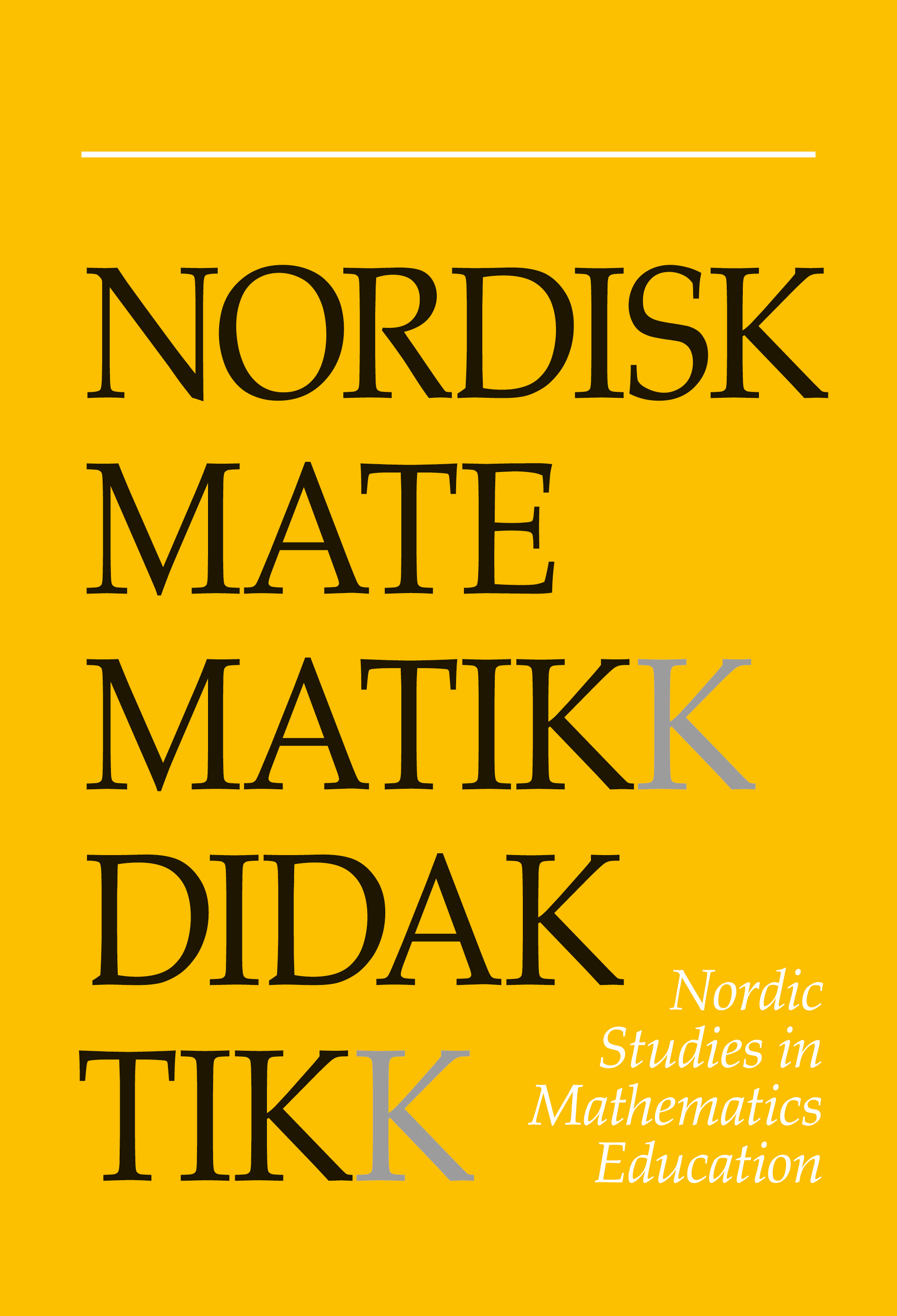Discourses in school algebra: the textbooks’ different views on algebra and the positioning of students
DOI:
https://doi.org/10.7146/nomad.v23i1.148949Abstract
The purpose of this study is to understand the school algebra offered in Swedish mathematic textbooks for grade 8. Using a social semiotic perspective, textbook tasks are analysed with a method inspired by Systemic Functional Linguistics. Five school algebra discourses are identified: symbolic discourse, geometrical discourse, arithmetical discourse, (un)realistic discourse and the scientific discourse. It is argued that these offer different views on the nature of algebra and the positioning of students.
References
Alshwaikh, J. (2016). Investigating the geometry curriculum in Palestinian textbooks: towards multimodal analysis of Arabic mathematics discourse. Research in Mathematics Education, 18 (2), 165-181. https://doi.org/10.1080/14794802.2016.1177580
Alshwaikh, J. & Morgan, C. (2014). The creation of mathematics in school textbooks: Palestine and England as example. In K. Jones, C. Bokhove, A. G. Howson & L. Fan (Eds.), Proceedings of the International Conference on Mathematics Textbook Research and Development (ICMT-2014) (pp. 141-146). School of Education, University of Southampton.
Bergvall, I. (2016). Bokstavligt, bildligt och symboliskt i skolans matematik: en studie om ämnesspråk i TIMSS. Uppsala: Acta Universitatis Upsaliensis.
Christie, F. (2012). Language education throughout the school years: a functional perspective. Language Learning, 62 (Supplement 1), 1-247.
Dowling, P. (1996). A sociological analysis of school mathematics texts. Educational Studies in Mathematics, 31 (4), 389-415. https://doi.org/10.1007/BF00369156
Fan, L., Zhu, Y. & Miao, Z. (2013). Textbook research in mathematics education: development status and directions. ZDM, 45 (5), 633-646. https://doi.org/10.1007/s11858-013-0539-x
Halliday, M. A. K. & Hasan, R. (1989). Language, context, and text: aspects of language in a social-semiotic perspective. Oxford University Press. Retrieved from https://catalog.hathitrust.org/Record/001833733
Herbel-Eisenmann, B. A. (2007). From intended curriculum to written curriculum: examining the "voice" of a mathematics textbook. Journal for Research in Mathematics Education, 38 (4), 344-369. https://doi.org/10.2307/30034878
Jakobsson-Åhl, T. (2006). Algebra in upper secondary mathematics: a study of a selection of textbooks used in the years 1960-2000 in Sweden. Luleå Tekniska Universitet. Retrieved from http://epubl.ltu.se/1402-1757/2006/33/
Jones, K., Bokhove, C., Howson, A. G. & Fan, L. (Eds.). (2014). Proceedings of the International Conference on Mathematics Textbook Research and Development (ICMT-2014). School of Education, University of Southampton.
Kongelf, T. R. (2015). Introduksjon av algebra i matematikkbøker for ungdomstrinnet i Norge. Nordic Studies in Mathematics Education, 20 (3-4), 83-109.
Le Roux, K. (2008). A critical discourse analysis of a real-world problem in mathematics: looking for signs of change. Language and Education, 22 (5), 307. https://doi.org/10.2167/le791.0
Luke, A. (1995). Text and discourse in education: an introduction to critical discourse analysis. Review of Research in Education, 21, 3-48. https://doi.org/10.2307/1167278
Morgan, C. (2006). What does social semiotics have to offer mathematics education research? Educational Studies in Mathematics, 61 (1/2), 219-245. https://doi.org/10.1007/s10649-006-5477-x
Morgan, C. (2016). Studying the role of human agency in school mathematics. Research in Mathematics Education, 18 (2), 120-141. https://doi.org/10.1080/14794802.2016.1176595
Morgan, C. & Sfard, A. (2016). Investigating changes in high-stakes mathematics examinations: a discursive approach. Research in Mathematics Education, 18 (2), 92-119. https://doi.org/10.1080/14794802.2016.1176596
Morgan, C. & Tang, S. (2016). To what extent are students expected to participate in specialised mathematical discourse? Change over time in school mathematics in England. Research in Mathematics Education, 18 (2), 142-164. https://doi.org/10.1080/14794802.2016.1174145
Palm, T. (2002). The realism of mathematical school tasks: features and consequences. Department of Mathematics. University of Umeå.
Rezat, S. & Strässer, R. (2015). Methodological issues and challenges in research on mathematics textbooks. Nordic Studies in Mathematics Education, 20 (3-4), 247-266.
Ryve, A. (2011). Discourse research in mathematics education: a critical evaluation of 108 journal articles. Journal for Research in Mathematics Education, 42 (2), 167-199. https://doi.org/10.5951/jresematheduc.42.2.0167
Schleppegrell, M. J. (2004). The language of schooling: a functional linguistics perspective. Mahwah: Lawrence Erlbaum. https://doi.org/10.4324/9781410610317
Sfard, A. (2013). Almost 20 years after: developments in research on language and mathematics. Review of J. N. Moschkovich (Ed.) (2010) Language and mathematics education: multiple perspectives and directions for research. Educational Studies in Mathematics, 82 (2), 331-339. https://doi.org/10.1007/s10649-012-9446-2
Sidenvall, J., Lithner, J. & Jäder, J. (2015). Students' reasoning in mathematics textbook task-solving. International Journal of Mathematical Education in Science and Technology, 46 (4), 533-552. https://doi.org/10.1080/0020739X.2014.992986
Verschaffel, L., Van Dooren, W., Greer, B. & Mukhopadhyay, S. (2010). Reconceptualising word problems as exercises in mathematical modelling. Journal Für Mathematik-Didaktik, 31 (1), 9-29. https://doi.org/10.1007/s13138-010-0007-x
Downloads
Published
How to Cite
Issue
Section
License

This work is licensed under a Creative Commons Attribution-NonCommercial-ShareAlike 4.0 International License.



